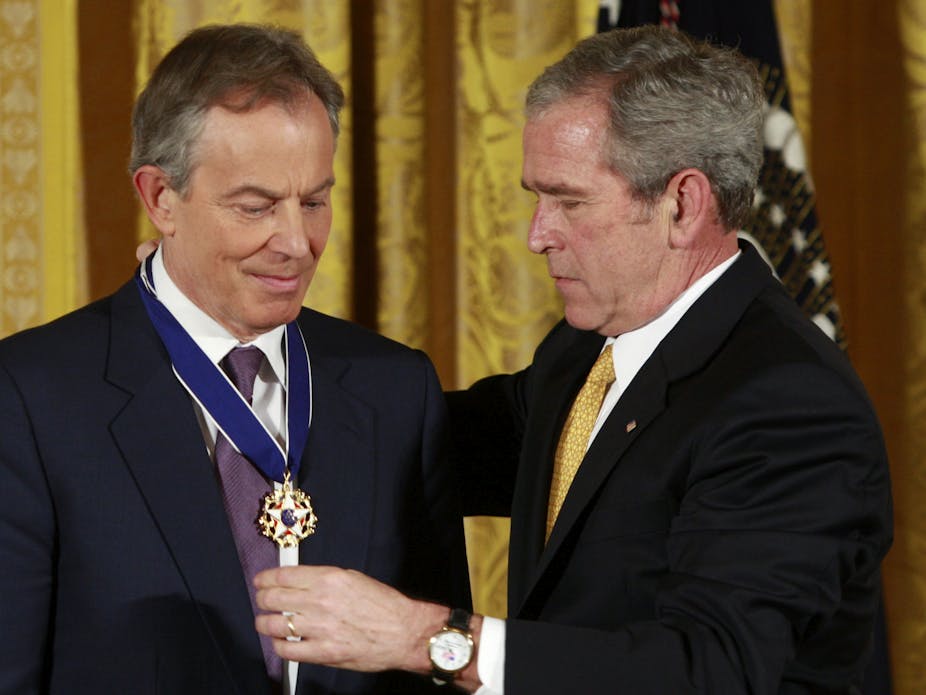In his recent interview with CNN, Tony Blair offered a qualified, limited apology for the Iraq War, which is the latest – but far from the last – step in a long and controversial battle to shape the narrative of the Iraq War and the following 12 years.
Ahead of the long-awaited publication of the Chilcot Report, Blair apologised during the interview for several mistakes made in the run up to the war, in particular, for the misleading use of intelligence. He also apologised for, in his words: “the mistakes in planning and, certainly, our mistake in our understanding of what would happen once you removed the regime”.
Despite this, Blair stated that he would find it “hard to apologise for removing Saddam”. It is difficult to disagree with him on the arguments for removing Saddam from power, however. After all, Saddam was responsible for systematic persecution of and discrimination against huge swaths of the Iraqi population, facilitated, largely by Western powers who supported and armed him during the Iran-Iraq war.

Of course, Saddam was not the first, nor the last Western ally to have engaged in such behaviour both domestically and regionally, but the experience with Saddam raises a number of important issues about long-term foreign policy making.
Islamic State rising
In perhaps the most interesting part of his interview, Blair also acknowledged that one of the consequences of the invasion of Iraq was the emergence of Islamic State (IS) and, in doing so, rejected one of the main premises of the war, namely that the invasion would prevent Iraq from becoming an arena for jihadists. In reality, as he acknowledged, the chaos that followed the 2003 invasion became a magnet for would-be jihadists, who would thrive off the grievances in post-Saddam Iraq – although his acknowledgement did come with a caveat:
It’s important also to realise, one, that the Arab Spring which began in 2011 would also have had its impact on Iraq today, and two, IS actually came to prominence from a base in Syria and not in Iraq.
This is where Blair’s claims become increasingly problematic, as the emergence and success of IS is indeed grounded in Iraqi politics. If one looks back at the emergence of the group, it rose from of the embers of al-Qaeda in Iraq and was facilitated by the American prison, Camp Bucca. For it was at this camp that Abu Bakr al-Baghdadi was able to develop a network of contacts that would later comprise the upper echelons of IS.

While the group was able to thrive after the Arab uprisings in Syria, it gained traction – and support – from an increasingly security-minded Iraqi population that was divided along sectarian lines. While history shows us that sectarian politics have routinely been mobilised across Iraq (and the Middle East broadly) as a tool of social control, the invasion removed state infrastructure and allowed militias to gain control over key spheres of influence as people were left with very few other options. Grievance was thus layered upon grievance – a process that was facilitated by foreign powers.
Taking the blame
The interview also raises an important question about the responsibility of the international community when dealing with crises of this nature. Blair suggests that in the post-9/11 world, the international community has turned to intervention in different forms, all of which have been problematic – ground troops in Afghanistan and Iraq, air strikes in Libya, and non-intervention in Syria.
Once again, Blair is right: The failure of the UN to respond to the Syrian crisis has left 250,000 people dead and millions becoming displaced from their homes – the worst humanitarian crisis since World War II. It has also provided a “finishing school” for those would-be jihadis from the region and beyond. However, bemoaning the failure of the international community to adequately respond to an increasingly complex and intractable conflict that draws in several tiers of proxy rivalry reeks of hypocrisy.
It is clear that Blair is seeking to lay the groundwork for the publication of Chilcot and a limited apology is perhaps a key part of his strategy to withstand the coming storm. Yet for many, Blair has not gone far enough with his apology and all he has achieved in his mea culpa is to state a few widely-accepted truths.
In a powerful piece for The Independent, Robert Fisk, long a critic of Blair, argues that the failings of Iraq were because Bush and Blair were driven by concerns about territory and not people; in other words, their policy towards the region was shaped by geopolitical imperatives, dressed up in humanitarian concerns.
If one looks at a history of British foreign policy towards the Middle East, this is hardly new; indeed, one need only look at the 1953 coup d’etat in Iran, or the Suez Crisis, three years later, to see the trumping of humanitarian concerns by realpolitik. The lessons from the Iraq War only serve to demonstrate this further – and the population of Middle Eastern states are paying a huge price. Blair and his ilk must properly acknowledge their role in this if these lessons are ever to be learnt.

